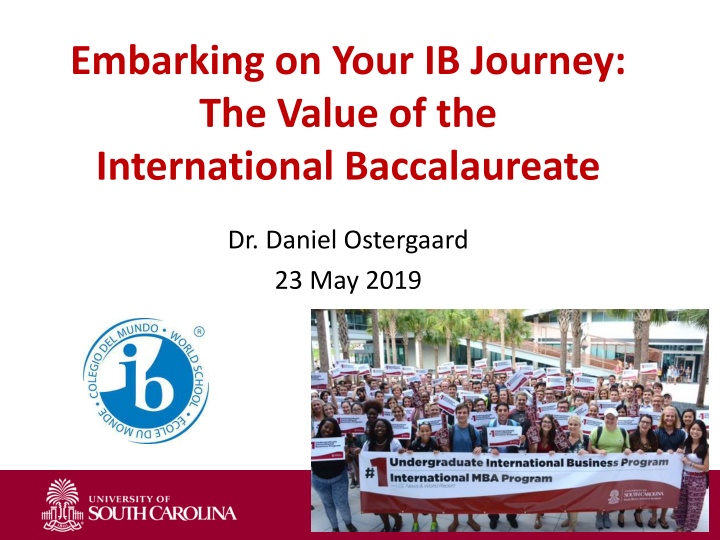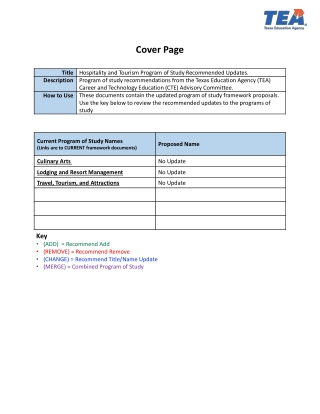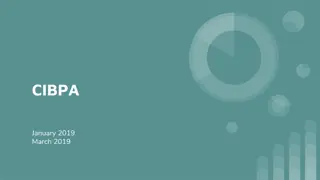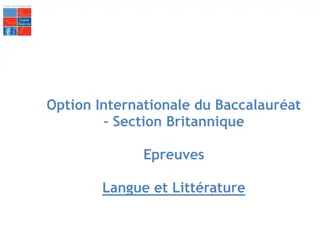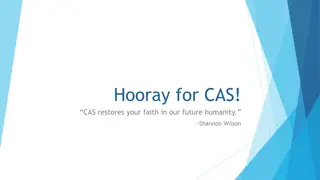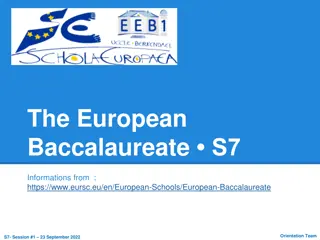The Value of International Baccalaureate Programs in Education
Dr. Daniel Ostergaard, an expert in International Business, highlights the significance of International Baccalaureate (IB) programs in shaping well-rounded and academically disciplined students. He emphasizes the importance of challenging oneself with rigorous coursework, such as IB Diploma or IB Career-Related Programs, to enhance cognitive development and transnational mindset. Navigating college admissions processes, including South Carolina Honors College, is discussed, stressing the value of good grades in a challenging curriculum for admission success.
Download Presentation

Please find below an Image/Link to download the presentation.
The content on the website is provided AS IS for your information and personal use only. It may not be sold, licensed, or shared on other websites without obtaining consent from the author.If you encounter any issues during the download, it is possible that the publisher has removed the file from their server.
You are allowed to download the files provided on this website for personal or commercial use, subject to the condition that they are used lawfully. All files are the property of their respective owners.
The content on the website is provided AS IS for your information and personal use only. It may not be sold, licensed, or shared on other websites without obtaining consent from the author.
E N D
Presentation Transcript
Embarking on Your IB Journey: The Value of the International Baccalaureate Dr. Daniel Ostergaard 23 May 2019 JAN 2013
Daniel Ostergaard, Ph.D. Associate Clinical Professor of International Business Darla Moore School of Business - University of South Carolina University of South Carolina, Ph.D. in Business Administration (International Business), 2016 Harvard University, Master of Public Administration, 2004 United States Naval War College, Master of National Security and Strategic Studies, 2003 United States Coast Guard Academy, Bachelor of Science in Government, 1994 Most importantly: Father of three current or rising International Baccalaureate students at Irmo High School. Disclaimer: Please note that any opinions expressed herein are mine alone and are not representative of an official position held by the University of South Carolina.
International Baccalaureate - Navigating the College Admissions Process 2Case Studies: South Carolina Honors College & USC International Business Program
2 different programs: International Baccalaureate (IB) Diploma or IB Career-Related Programs Transnational Mindset Cognitive Development Looking at the World Differently Hard Work Academic Discipline Think Write Influence Cohort of Like-minded Students Well-Rounded Leaders beyond the classroom! (Eagle Scouts, Sports, Band, JROTC, etc...)
Navigating the Admissions Processes: Example: South Carolina Honors College Going to give you a lot of information quickly because it is better for you to know it is out there than to withhold it because it is too much...
Admissions want to see good grades in a hard curriculum. In general, university admissions want to see students do well in a challenging curriculum, whether it s IB (if available), AP, dual enrollment, or honors. Some students do not have access to IB at their schools, so the key thing is challenging yourself and not settling just because something could potentially be easier. Admissions want to see good grades in a hard curriculum. Frequently people ask if an A in an honors course is better than a B in an IB/AP course. Frankly, most would rather see an A in an AP or IB course! This question is common with parents of high school sophomores and freshmen, and my immediate thought is why go ahead and speculate when the course hasn t even been attempted? Go ahead and take the more challenging course and see what happens. Also, as you know, taking the challenging course can lead to earning college credit. For Honors College admission and Top Scholar consideration, for example, files can be reviewed up to six times in the process, so it s imperative to have a challenging curriculum.
How important are their standardized test scores? Standardized test scores are important as a threshold to be considered for most honors programs. Admissions want to see that students can succeed to a certain standard, but after threshold scores, colleges do holistic review of the entire application including essays, letters of recommendation, transcript & coursework, and extra-curriculars (resume). Example: Some honors programs may have Threshold scores to be considered (another reason to understand the schools you are considering). Threshold scores may look something like this: 1340 on SAT (can be superscored1) 29 on ACT (best one-time test) In the context of South Carolina Honors College for example, it is important to understand these scores in context of our admitted students. The admitted class profile* for the South Carolina Honors College in Fall 2018 was: SAT average: 1492 ACT average: 32.9 (*Source: https://sc.edu/about/offices_and_divisions/undergraduate_admissions/requirements/for_freshmen/admitted_class_profile/index.php) 1Superscoring: colleges consider your highest section scores across all the dates you took the SAT - forming the highest possible composite score.
How do you weight International Baccalaureate courses vs AP vs regular courses? USC looks for a specific distribution of classes (see USC Website or link on last slide) AP, IB, and Honors are all weighted more heavily than standard level courses. See AP/IB scores on the USC Website or link on last slide. (example on next slide) Note that Standard Level IB Courses will not receive credit for exams. Honors admitted students in Fall 2018, WCGPA average (high school average): 4.71 High scores on these tests may result in college credit at USC. Students taking AP exams must earn a score of "3" or above in order to receive credit, while students enrolled in higher-level IB courses must score a minimum of "4" on IB examinations. In many cases, AP test scores higher than "3" and IB test scores higher than "4" result in additional college credit awards. Students planning to attend USC should have their AP scores sent to the University at the time of their testing.
Helpful Links from the University of South Carolina Website Required High School Courses: https://www.sc.edu/about/offices_and_divisions/undergraduate_ad missions/requirements/for_freshmen/required_high_school_course s/index.php AP/IB Credits: https://www.sc.edu/about/offices_and_divisions/undergraduate_ad missions/requirements/for_freshmen/ap_ib_credits/index.php South Carolina Honors College: https://www.sc.edu/about/offices_and_divisions/undergraduate_ad missions/honors_and_scholars_programs/index.php
Any other thoughts on International Baccalaureate that they should know about the USC Honors College? What students like about International Baccalaureate generally tends to be the smaller class size, discussion-based experience, and surrounding themselves with like-minded, driven students. That is what they will get at South Carolina Honors College! Additional benefits: Honors Dorm Honors Classes Average class size: 16
Deadlines One of the most important factors that is absolutely in your control is your attention to Admissions Deadlines! Your success depends on meeting deadlines. Stay current and check back often to see if dates have changed. Rolling Admissions: Think about rolling admissions... Is it better to be one of the first to have your application package submitted early when the admissions slate is wide open or is it better to wait until the last minute in the hope of filling the last available seat? Needless to say, college admissions is no time for procrastination.
A Tale of 2 IBs: The Value of an International Baccalaureate (IB) & Case Study: USC International Business (IB) Includes an overview of our International Business (IB) classic major IB cohorts Initiatives and Future
International Business Major: Ranked #1, 20 years in a row IB Faculty have been ranked #1 in research productivity by the Journal of International Business Studies Highly selective group of students Double major: IB + functional business major 4 300-level courses in foreign language Study abroad experience IB Classic IB Cohorts 1 semester abroad In addition to IB, must at least 1 from 8 functional majors offered at Darla Moore School of Business Study alongside peers for 4 semesters in a small cohort setting (2- 3 semesters abroad) Each cohort has specific language and/ or functional area of focus
Undergrad International Business Immediate Admission How do students apply to the Honors College? USC Admissions Application Portal October 15 Early Answer General Admissions Deadline November 15 Honors College Application Deadline DOUBLE-CHECK THESE DATES FOR YOURSELF! What are typical test scores and grades for admitted students to SCHC? In 2016, the middle 50 percent of students in the South Carolina Honors College had an SAT score between 1450- 1520, or an ACT composite score between 31-33.
Immediate Admission for International Business at USC This is granted to Honors College students who checked the pre-international business major box on their USC application. Immediate Admission students must maintain a 3.65 USC GPA, meet DSMB freshmen progression requirements, and complete 30 credit hours by the end of the second semester to keep their place in the international business major. Students who meet these criteria are admitted directly into the major and do not compete with other students for admission.
Let me reiterate that last slide! Students who meet these criteria are admitted directly into the major and do not compete with other students for admission. My Opinion: This is a great example of why it pays to work hard in High School! Automatic admission into the #1 international business program in the world if you are accepted into the South Carolina Honors College.
IB Classic Requirements IB Specific Coursework Advanced Language Training Study Abroad Second Business Major Accounting Business Economics Finance Insurance and Risk Management Management (Human Resources or Entrepreneurship Track) Management Science (Global Supply Chain and Operations Management) Marketing Real Estate JAN 2013
Foreign Language Approved languages include: Arabic Japanese Chinese Portuguese French Russian German Spanish Italian All students must complete 4 language-based classes at the 300-level or higher by graduation (not in English) Intensive summer language programs are strongly encouraged to accelerate language learning *300-level courses taken before the 200-level sequence are not considered to be advanced language courses for the IB language requirement; 300-level courses taught in English also do not apply
Study Abroad IB Global Exchange Program: All students will attend a top business school from a portfolio of partner institutions from around the world Required for all students in Spring Semester following the Spring term they complete IBUS 310 typically Junior Spring Focus of the study will be on business content to meet degree requirements and to take courses not available at USC Full study abroad briefing in February for all accepted students
Study Abroad Objectives Academic Experiential Career Learning experience at outstanding foreign business school Opportunity to develop a peer network in country/region Cultural exposure Extended living experience overseas Use of partner school reputation to enhance your credentials Access to global and regional expertise beyond USC Development of independence, flexibility, and adaptability Understanding of alternate ways of doing business Evidence to employer of ability to adapt Interaction and networking with future business elites in country/region Complementary learning wider course selection Development of transferable skills Availability of courses to support USC second major Exposure to business strategies and practices abroad Possible development of superior language skills through content courses **Focus of the study abroad will be on business content to meet degree requirements and to take courses not available at USC JAN 2013
Foreign Language and Study Abroad Some exchange partners require business content coursework in local language Proficiency at or above the 300-level may be necessary prior to exchange semester Language skills can be quickly improved through intensive summer language programs either at USC, through another US institution, or possibly abroad to reach proficiency prior to exchange semester
List of IB Global Exchange Partners Netherlands Erasmus University: Rotterdam School of Management Tilburg University: School of Economics & Management Scotland University of Strathclyde University of Edinburgh Sweden University of Gothenburg Northern Europe Belgium Louvain School of Management ICHEC Brussels Management School Denmark Copenhagen Business School England University of Warwick Business School Finland Aalto University
List of IB Global Exchange Partners Western Europe Austria Vienna University of Economics & Business France ESSEC Business School EM-Lyon KEDGE Business School University of Paris Dauphine Germany LMU Munich University of Mannheim Business School WHU Otto Beisheim School of Management Switzerland University of Applied Sciences University of St. Gallen
List of IB Global Exchange Partners Eastern Europe Czech Republic University of Economics, Prague Hungary Corvinus University of Budapest Southern Europe Italy Bocconi University Libera Universit Internazionale degli Studi Sociali (LUISS) Spain Colegio Universitario de Estudios Financieros (CUNEF) IE University Universidad Carlos III de Madrid University of Navarra
List of IB Global Exchange Partners Latin America Argentina Universidad Torcuato di Tella Brazil Pontifica Universidade Catolica do Rio de Janeiro FGV EBAPE Chile Universidad de Chile Mexico Instituto Tecnologico de Estudios Superiores Peru Pontificia Universidad Catolica de Lima Uruguay Universidad ORT Destination of Risk petition required
List of IB Global Exchange Partners Southern Asia China Chinese University of Hong Kong Hong Kong Polytech University City University of Hong Kong Fudan University School of Management Renmin University of China Shanghai Jiao Tong University Tsinghua University Japan Keio University Waseda University Hitotsubashi University Singapore- National University of Singapore South Korea Korea University Business School Sungkyunkwan University Yonsei University Taiwan- National Chengchi University Vietnam- Foreign Trade University
List of IB Global Exchange Partners Northern Africa Morocco ESCA Ecole de Management Southern Africa South Africa University of Cape Town *Global Partner Program Western Asia Israel Hebrew University of Jerusalem United Arab Emirates Ajman University American University of Sharjah Turkey Koc University Oceania Australia - Queensland University of Technology
Immediate Admission This is granted to Honors College students who checked the pre-international business major box on their USC application. Immediate Admission students must maintain a 3.65 USC GPA, meet DSMB freshmen progression requirements, and complete 30 credit hours by the end of the second semester to keep their place in the international business major. Students who meet these criteria are admitted directly into the major and do not compete with other students for admission.
Immediate Admission Requirements- Classic Track DMSB Freshmen Progression Requirements GPA & Course Requirements- Sophomore Year Achieve a 3.650 USC GPA on 30 hours or more at USC by July 1, 2019 Maintain 3.5 or above USC GPA at the end of Fall 2019 Declare a primary foreign language of study to meet advanced language requirement by July 1, 2019 Complete 200-level business courses by end of Fall 2019 Course requirements Junior and Senior Years Enrollment in IBUS 310 at USC in Spring 2020 Complete major courses in thematic, functional, and regional categories Complete advanced foreign language requirement by graduation Second Major Requirement Study Abroad Requirement Conduct & Behavioral Record *IB Expectations form is required for students to sign; it is emailed to students and reviewed during advisement JAN 2013
Immediate Admission How do students apply to the Honors College? USC Admissions Application Portal October 15 Early Answer General Admissions Deadline November 15 Honors College Application Deadline What are typical test scores and grades for admitted students to SCHC? In 2016, the middle 50 percent of students in the South Carolina Honors College had an SAT score between 1450- 1520, or an ACT composite score between 31-33.
If not Immediate Admission... Then Competitive Admission This is the process in which students apply in the spring semester of their freshman year. Students must have a minimum 3.65 USC GPA and have completed 30 college-level semester credits. The application for Fall 2019 will be available in April 2019 and due in June 2019. The Admissions Committee reviews each student for: USC GPA Rigor of quantitative courses completed Grades in math, business and language courses Selected language for advanced study Language level Personal statement/essays Clearly articulated career goals Resume/other achievements No single criterion is sufficient to qualify or disqualify a candidate. The major is subject to a cap on enrollment. Candidates may be well qualified but not admitted because of the limitations on program size.
What are my chances if I take the competitive admission route? Planned class sizes of 140 and growing. Exact number of available seats based on those Honors College students given Immediate Admission at the time of USC enrollment. The remaining seats are open in the competitive process. The average number of competitive admits varies from year-to-year but has been between 40-60. After the minimum criteria for admission has been met, no single criterion is enough to qualify or disqualify a candidate. Candidates may be well qualified but not admitted because of the limitations on program size.
Class of 2021 Admissions Profile Grade Point Average Immediate Competitive Combined Languages Arabic Chinese French German Italian Japanese Portuguese 1 Russian Spanish 3.884 3.934 3.904 3 13 24 14 8 5 Distinction: Honors College 90 Capstone 25 4 70 Total 142
Admissions Criteria (1) No single criterion is sufficient to qualify or disqualify a candidate. Academic Performance at the University of South Carolina through July 1, 2019. Academic Performance on five required first-year courses that you have completed: MATH 122 or 141, STAT 206, ACCT 225, ECON 221 or 222, and MGSC 290. Level of language competency achieved in the chosen language and other foreign languages, along with academic performance in foreign language courses.
Admissions Criteria (2) Clarity of expression, depth of insight, thought and analysis, evidence of objectivity, passion and judgment, and other attributes, as expressed in the essays required on the application. Evidence of understanding the purpose of the International Business major and how participation in the major will contribute to personal development of the candidate. Evidence of global awareness and a frame of reference that goes beyond a region or country and encompasses the world
Admissions Criteria (3) Evidence of respect for cultural differences. Evidence of interest in International Business and the global business arena, and evidence that the candidate has taken past action to act on that interest. Participation in activities, either within or external to the University, and particularly those which have provided assistance to others in some way. Demonstrated ability to work with others to accomplish goals. Other evidence of potential success in the program.
Conditions of Admission Admission to the IB Major is conditional on: Maintaining a 3.5 or above USC GPA GPA will be reviewed at the end of Fall 2019 Completion of the remaining Lower Division Courses by the end of Fall 2019 (ACCT 226, ECON 221 and 222, MGSC 291) Enrollment in IBUS 310 in Spring 2020 Purpose: To Provide a Common Experience to Majors Admitted in a Given Year Commitment to Study Abroad in the Spring Semester 2021 at one of IBUS Exchange Partner Schools *placement is earned through competitive process* Retention of eligibility for study abroad (review of Conduct Record)
International Business Major: Ranked #1, 20 years in a row IB Faculty have been ranked #1 in research productivity by the Journal of International Business Studies Highly selective group of students Double major: IB + functional business major 4 300-level courses in foreign language Study abroad experience IB Classic IB Cohorts 1 semester abroad Can choose from 8 functional majors offered at Darla Moore School of Business Study alongside peers for 4 semesters in a small cohort setting (2-3 semesters abroad) Each cohort has specific language and/ or functional area of focus
What is a cohort? Cohorts contain between 10-40 students, combining students from both USC and international partner schools Rotate together across campuses The start of your global professional network Unparalleled experience of a culture/ country
Six Cohort Programs Students in these programs will spend multiple semesters abroad (in some cases in multiple countries) Cohort Study abroad Regional focus Skill focus IBCE Hong Kong China, SE Asia IBA Santiago Latin America IBMENA Cairo Middle East CIFA Paris Finance/Economics IBEA Germany, Singapore, and Brazil Management Consulting GBI Shenzhen, Auckland Management Innovation
IBCE Regional focus: China, SE Asia (International Business & Chinese Enterprise) Language: Mandarin Chinese 3 semesters in Hong Kong (China) + 2 summer language programs
IBA Regional focus: Latin America (International Business of the Americas) Language: Spanish 2 semesters in Santiago (Chile)
CIFA Skill focus: Finance/Economics (Commercial International France Amerique) Language: French 2 semesters in Paris (France)
Skill focus: Management Consulting IBEA (International Business Education Alliance) Language: German,French or Portuguese 3 semesters: Mannheim (Germany); Singapore; Rio de Janeiro (Brazil)
Skill focus: Management Innovation GBI Language: Arabic, Chinese, French, German, Italian, Japanese, Portuguese, Russian and Spanish (choice is dependent on proficiency level of student) (Global Business and Innovation) 2 semesters: Shenzhen (China); Auckland (New Zealand)
Whats the value of a cohort? Develop a network of professionals: Develop close-knit community of peers from USC & international partners Experiential learning: International business competence Proficiency in foreign language and culture Skills acquired: Flexibility, adaptability, problem-solving, cross-culture competence, global mindset, ability to deliver immediately in new environments Cohort Specialization Challenging academic environment + unique regional/functional experience Differentiation factor in the job market by articulating unique experience on a resume
